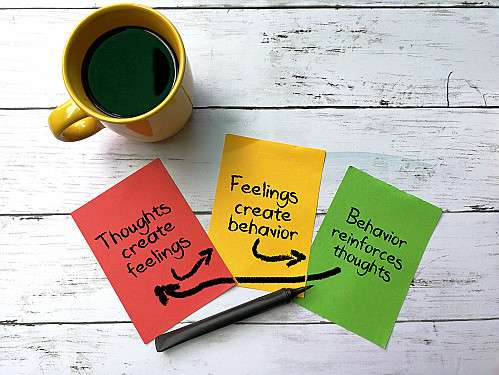October 23, 2018
Dr. Luana Marques is the director and founder of Community Psychiatry PRIDE at Massachusetts General Hospital and an Associate Professor in Psychology at Harvard Medical School. She completed her PhD in Clinical Psychology at The State … See Full Bio
Dr. Soo Jeong Youn is the Director of Evaluation at Community Psychiatry Program for Research in Implementation and Dissemination of Evidence-Based Treatments (PRIDE) at Massachusetts General Hospital (MGH), and an Assistant Professor in Psychology in the … See Full Bio
As a service to our readers, Harvard Health Publishing provides access to our library of archived content. Please note the date of last review or update on all articles.
No content on this site, regardless of date, should ever be used as a substitute for direct medical advice from your doctor or other qualified clinician.
CBT FOR ANXIETY – HOW LONG WILL IT TAKE?

Does CBT work for anxiety?
When you suffer from anxiety, it is natural for you to want to feel better as soon as possible. Many people seek cognitive behavioural therapy (CBT) as their treatment of choice for anxiety issues. This is because evidence-based research demonstrates that CBT for anxiety can be a highly effective treatment; in fact GPs often recommend it. But how long will the treatment take? It’s a question that many people ask when considering treatment.
How long does CBT take – factors affecting length of treatment
According to the government’s mental health recommendations (NICE), 6 to 24 sessions are recommended for effective treatment. There are some common factors that influence the number of sessions you are likely to need to achieve a successful outcome, using CBT for anxiety. However, since every individual is unique, there are bound to be variances. Someone with severe anxiety may find they feel better quicker than expected, while someone with mild anxiety may find they need more support, due to other influencing factors.
Anxiety severity
Anxiety severity, then, is the most common factor determining the number of cognitive behavioural therapy sessions you are likely to need. Anxiety severity is generally categorised into 3 types:
Mild Anxiety: This occurs when bouts of anxiety arise in response to specific situations, for short periods of time. The feelings of anxiety are uncomfortable but manageable, and they may or may not be accompanied by panic attacks. The anxiety does not prevent the sufferer from carrying out day-to-day activities but it might cause them to avoid certain situations, in an attempt to stop anxiety from occurring.
Moderate Anxiety: This is when bouts of anxiety occur more frequently in day-to-day life and panic attacks may be present. Anxiety can be brought on by specific trigger situations. Sufferers can also experience a underlying feeling of general anxiety that doesn’t seem to be attached to anything specific but hangs around for several hours or longer. Sufferers can still manage day-to-day life, however their anxiety can interfere in a more problematic way, causing the individual to avoid certain situations or issues that they should really deal with.
Severe Anxiety: This is when anxiety presents on a daily basis, often with panic attacks. Sufferers can find it extremely difficult to manage their day-to-day life. Severe anxiety can prevent them from engaging in important tasks and, in worst case scenarios, it can prevent them from working, enjoying healthy relationships, engaging socially and leading a normal life.
Additional factors
Other factors that may affect the length of treatment needed include
- The length of time that you have been experiencing anxiety
- The degree of change that you are hoping to achieve
- The extent to which CBT therapy matches your personal learning style
- The question whether CBT therapy alone can help you achieve lasting change
- Your life situation
- Your level of self confidence
How long does CBT take to treat mild anxiety?
3 to 12 sessions may be sufficient to treat a presentation of mild anxiety. CBT therapy alone can help you gain an understanding of your anxiety and identify some effective strategies to deal with it. At KlearMinds, our sessions for individuals last 50 minutes. Meetings usually take place weekly, at the same time on the same day since this format has proved most effective.
How long does CBT take to treat moderate anxiety?
6 or 12 to 24 sessions of CBT therapy may be enough to successfully treat a presentation of moderate anxiety. Some people may need a bit longer, for instance where symptoms have been contained in the background for some years prior to treatment. When treating moderate anxiety, CBT therapy can sometimes be limited in its ability to help sufferers understand and address underlying root causes of anxiety. If root causes are addressed, this can help people better understand background issues that trigger their anxiety. It can also enable them to feel better equipped to deal with any “unexpected anxiety” that may occur in the future.
How long does CBT take to treat severe anxiety?
A minimum of 24 sessions of CBT therapy may be needed to treat a presentation of severe anxiety. Some individuals may recover more quickly, while others may require 48 or more CBT sessions combined with additional therapies to ensure that underlying root causes of anxiety are tackled. Because root causes are always an influencing factor in maintaining severe anxiety, the best outcomes can be achieved if the therapy addresses them. By integrating other psychotherapy approaches alongside CBT, it can be possible to achieve more effective and lasting change.
To learn more about the range of therapies we provide at KlearMinds to help when CBT therapy alone may not be enough, click here.
FURTHER INFORMATION ON ANXIETY AND CBT THERAPY
How Cognitive Behavioural Therapy Can Help Treat Anxiety Disorders
CBT for Social Anxiety
Panic Attacks: How Can Cognitive Behavioural Therapy Help?
CBT for Panic Attacks
Ten Tips For Managing Panic Attacks
Is Cognitive Behavioural Therapy More Effective Than Medication in Treating Anxiety?
CBT for Stress
Anxiety In The UK – Infographic
Anxiety Management
How Can Cognitive Behavioural Therapy Help to Treat Depression?
CBT for Low Self Esteem
CBT for Anger Management
Cognitive Behavioural Therapy (CBT) in London

Not sure which therapist or type of therapy you need?
Get in touch with Maggie Morrow, Award Winning Therapist & KlearMinds Director.
Maggie can help match you with the right therapist based on your needs.
Get In Touch
Like this post? Spread the word!
You’ve probably heard of cognitive behavioral therapy (CBT), the evidence-based psychotherapy treatment method focused on changing negative thoughts and behaviors. It seems to be mentioned in nearly every self-help article online: Sleep problems? Try CBT. Childhood trauma? CBT may help. Anxiety, depression, low self-esteem, fear of flying, hangnails? CBT is the answer for you.
Basically, there’s a good chance you’ve either received CBT or know someone who has. So what is it? Does it really alleviate psychological distress, and if so, how? How much does it cost, and can you just use the techniques on your own? These kinds of details can be a mystery to the general public. Lucky for you, I’m a clinical psychologist who uses CBT in my practice, so I should be able to answer most of the questions you have about it. Let’s dig into them one at a time.
1. First, what the heck is CBT?
CBT is one of scores of treatment methods used in psychotherapy. It’s based on the assumption that many of life’s problems stem from faulty thoughts (that’s where “cognitive” comes from) and behaviors. By intentionally shifting them toward healthier, more productive goals, we can alleviate distress. In practice, cognitive behavioral therapy generally consists of identifying the problematic thoughts and behaviors and replacing them with healthier responses.
For example, say Jane Doe is anxious in social situations and has started to avoid gatherings in favor of isolating evenings at home. A CBT therapist may educate her about the fear response that is being irrationally triggered, teach her how to shift her thoughts and relax her body, and develop an action plan to help her remain calm while engaging in the party this weekend. Next week, they’ll evaluate what worked and what didn’t, and tweak their methods until Jane can comfortably socialize.
2. What kinds of issues can CBT help address, and how do I know if it’s right for me?
CBT is used for anything from phobias, anxiety, depression, trauma, self-esteem issues, and ADHD, to relational problems like poor communication or unrealistic expectations of your partner. Basically, if it’s an issue that involves thoughts and behaviors (which covers a lot of ground), CBT has a treatment approach for that.
Is it right for you? That’s a difficult question. Do your problems concern how you think and behave? For example, are you ruminating about a past breakup or finding yourself mindlessly shopping online? If so, then yes, you could probably benefit from CBT. If you are more concerned about your purpose or meaning in life, or about what moments from your past color who you are today, there may be other approaches that fit better for you (and we’ll get to that in question #9).
3. What makes CBT so popular?
One of the reasons CBT is so well-known and widely used is because it has been studied so extensively. It is a good modality to study because it emphasizes brief, direct, solution-oriented interventions. In other words, the aim is to produce clear, measurable changes in thoughts and behaviors, which is a goldmine for researchers. It also means you get to see quick results.



